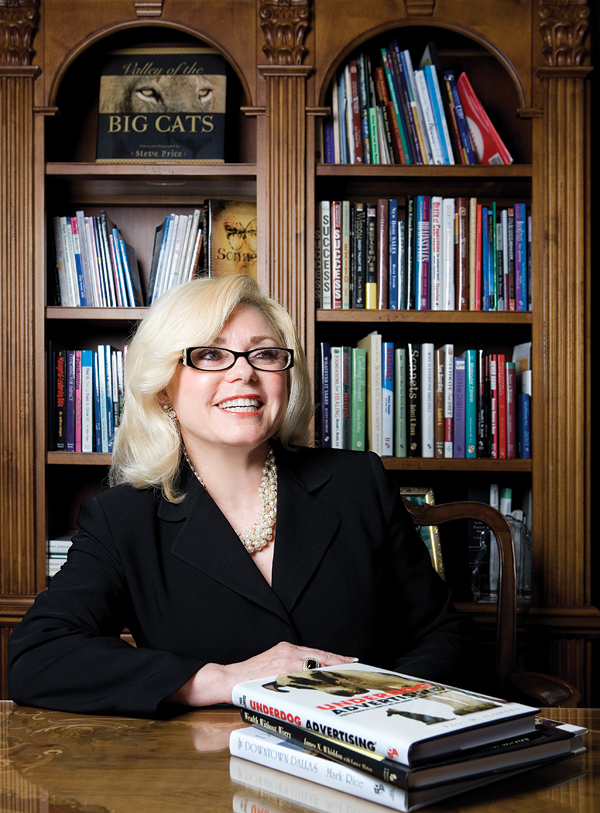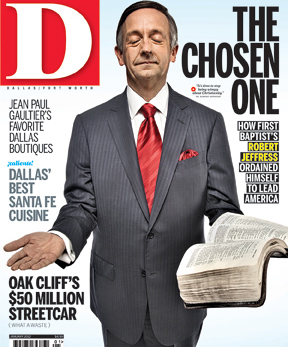The novel by first-time author Kim Gatlin had the potential to be one of the biggest successes ever for Milli Brown and her Brown Books Publishing Group. Published by the Dallas-based company in 2008, Gatlin’s controversial Good Christian Bitches took off like a fireworks display on New Year’s Eve.
The fictional story, about a newly divorced mother of two who moves back home to Hillside Park (read: Highland Park) for a fresh start, not only attracted national attention for its titillating title. It also was optioned by TV producer Darren Star, the man responsible for such hit shows as Beverly Hills 90210 and Sex and the City. ABC then picked up the project, which will debut in March as a midseason replacement for the 2011-12 television season.
Annie Potts and Kristin Chenoweth are set to star in the adaptation of Gatlin’s book, which now has been given a tamer title, GCB, to avoid offending Christian and women’s groups.
Alas, you won’t find any reference to Good Christian Bitches on Brown Books’ website. And neither Milli Brown nor Gatlin will speak for the record about their publishing partnership. The reason: Gatlin filed a lawsuit against Brown and her company over the book in December 2009, and the parties eventually entered into a settlement agreement that includes a strict confidentiality clause.
According to Dallas County District Court documents, Gatlin alleged that Brown attempted “to profit from Gatlin’s naïveté as an aspiring author” by making “fraudulent and negligent misrepresentations, engaged in deceptive trade practices, and materially breached its agreement with Gatlin.”
Specifically, the writer charged in her suit, the publishing company induced her to pay a ghostwriting fee of $73,500 that included a “100 percent markup,” never disclosing that the fee paid to the actual ghostwriter was just $36,750. Gatlin further alleged that Brown Books significantly boosted charges without notice by tens of thousands of dollars for various services.
The author also claimed that the publisher recommended unreasonably that she purchase 20,000 copies of the novel, and misrepresented its ability to market the book, according to the documents. In addition, Gatlin alleged that Brown Books failed to register a copyright for the novel, wrongly blocked her access to a warehouse where her unsold books were stored, and “went above and beyond to ensure that
Gatlin’s movie and television rights would never be realized.”
Gatlin’s lawsuit offers one surprising, behind-the-scenes version of business at Brown Books (“The Entrepreneurial Publisher for Entrepreneurial Authors”), a privately held company that has mainly drawn local praise for its pioneering publishing model. It also hints at the controversy surrounding Milli Brown, the firm’s founder and CEO. Brown is lauded by some as a successful, up-by-the-bootstraps innovator. But she is criticized by others who say her company’s services are sometimes less than promised.
Unconventional Model
Brown, who declines to disclose her age, prides herself on being an atypical book publisher. While the major publishing companies won’t even consider a manuscript unless it’s already fit for print, Brown says, she is “looking for a kernel to work with. I knew that I was different when I would read a manuscript not for what it was, but for what it could be.”
A prime example, she says in an interview at her office off the Dallas North Tollway, is Ebby Halliday’s original manuscript for her book, Ebby Halliday: The First Lady of Real Estate. The manuscript, Brown says, was many times as long as it needed to be. “It contained a lot of family history,” she says, “but what people wanted was [Ebby’s] wisdom. How did she do this, how did she do that? It took a lot of developmental edits to get at the heart of Ebby’s story.”
The traditional business model for publishers involves buying an author’s rights in return for a royalty of around 10 percent of sales. The publisher assumes the risk of bringing the book to market, but also takes the lion’s share of the profits should it make money. Brown Books, on the other hand, says it lets its authors retain all rights and profits to their books. Brown makes its money by charging authors for services rendered—ghostwriting, editing, designing, printing, packaging, distributing and marketing. The author assumes the risk in return for maintaining control of the rights, and also stands to reap the reward should the book exceed expectations.
“Everyone told me I could not do it this way,” Brown recalls. “But I knew if I kept up standards and kept publishing credible authors, somehow the doors would open. And it turned out that way.”
Some Brown Books authors and ex-employees tell a different story, however.
Some of the writers, like Paul Spiegelman, CEO of The Beryl Companies, and Jeff Crilley, a public relations specialist, are unabashed admirers of Brown’s operation. Crilley, who wrote a book called Free Publicity: A TV Reporter Shares the Secrets for Getting Covered on the News, says he has sold 65,000 copies of the title, making him one of Brown’s most successful authors. “Milli is the Rolls-Royce in Texas of self-publishing,” he says. “What she does is open the doors to the big book distributors. … In a sense, she helped me get to where I am today.”
Other authors and former employees, echoing some of the charges made in Gatlin’s lawsuit, are far less complimentary. While they universally praise Brown’s ability to produce a quality product, some are sharply critical of how much the company charges, its representations about the number of books that would sell, and its marketing and public relations prowess. Several declined to speak on the record for this article, saying they feared retribution by the publisher.
“She did a very good job producing the book. But as marketers, they were atrocious,” says Ron Stout, a business consultant and former sales executive who wrote a Brown-published book called Secrets from Inside the Clubhouse: What Men REALLY Think About Women. “It was a total waste of my money. Later I learned that there are companies that handle publicity on an à la carte basis. It’s the old, ‘caveat
emptor.’
“Between marketing and publishing, I spent over $75,000,” Stout says. “I ordered 5,000 books and sold 1,000 of them, mostly myself. I recently told her to burn the rest of them; they were still sitting in a warehouse. The publishing part is overpriced, because you can get just as good quality for less money. In retrospect I wouldn’t go with them again.”
Dayna Steele, a business speaker and author of the Brown-published book, Rock to the Top, says she spent $42,000 on the book, which was a “great calling card” to sell or use as a marketing tool at her speaking engagements. In retrospect, she says, “I would have done things differently—but I learned. I’ve watched too many young authors go into debt to do this. …
“I would advise people to hire a true publicist that has [real] contacts,” Steele opines. “Milli’s company tries to sell you a PR/marketing package, but I say let them do the printing—not the marketing. I feel like there is a conflict of interest, because they are working on so many other projects. You get wrapped up in all the glamour and they say, ‘This one really has a good chance,’ which is what they tell everyone.”
Another writer, who asked to remain anonymous, tells of being advised by the company to purchase thousands of books for sale, which was not a realistic probability. “So, I am left with a lot of books. It’s my error, for not knowing, and their poor advice. I did not use their PR. Even so, there are a lot of hidden costs.”
Asked to comment on these criticisms, Brown says she would put her PR and marketing team—they’ve been with her eight to nine years—up against any in the business. “A lot of people suffer from ‘magical thinking,’ that they’re going to become a best-selling author,” she says. “I tell every one of them: ‘You might not sell one book.’ There is no guarantee.
“But, some authors don’t have the patience. They expect everything to start happening, but it doesn’t happen instantaneously. The authors with the biggest budgets have done the best. The ones who spend $8,000 for three months—that won’t work.”
Asked about complaints regarding pricing and “hidden” charges, Brown says that “a proposal is more like a guesstimate,” and costs may rise if more work is done. However, “everything is in there in [the proposal] in writing; nothing is hidden,” she says, adding, “There is so much information for new writers to absorb. Sometimes they don’t listen—even after they’ve been told something three times. We could not be more transparent.”
In addition, Brown goes on, “no one on our staff is ever allowed to tell someone how many books to print. We do explain the advantages and disadvantages of [each option], and they make the decision.”
Brown is accustomed to being the target of skeptics.
One line of criticism, for example, characterizes Brown Books as little more than a vanity press. “Brown is vanity,” says one prominent literary agent who asked not to be identified. “She has no credibility at all as a ‘real’ publisher.” Then again, Brown’s supporters would argue, that’s the sort of judgment one would expect from a literary agent. Brown represents a threat to that business. If more publishers began to copy her business model, agents would stand to lose a lot of their mid-list authors, leaving them in a mad scramble to sign the few potential blockbusters that come along every year.
Brown recognizes and accepts this animosity.
“Agents hate me,” she says. “They make no money on my books. And as far as being a ‘real’ publisher, my books get into all the stores and are reviewed by all the major publications. I have all the privileges of a large publisher. And my books sell, which is the bottom line.”
‘Ahead of Her Time’
Michael Levin, an attorney-turned-writer who has ghostwritten books for local sports figures Pat Summerall and Chad Hennings as well as dozens of other celebrities and business executives, has worked with Brown on a number of projects over the years. “Unfortunately, there is no such thing as licensing or quality control for individual publishers or ghostwriters,” Levin says. “I’ve never seen so many scam artists as there are on the Internet right now.”
To illustrate the difference between her operation and others, Brown pulls one of her books off a shelf in her office conference room. It’s by local business legend Comer Cottrell. After allowing a reporter a moment to admire and leaf through it, she sets a self-published Cottrell biography printed by another publisher next to it. The text is so large it appears to be a children’s book. It’s not. It is, however, riddled with typos and poor grammar, and the cover design is almost laughable.
“In the early days,” Brown says, “I turned down about 75 percent of what came to me. You see lots of non-viable projects. I have a whole file room in the back filled with rejects. From Day One, I’ve expected some reporter to turn up determined to play hardball. ‘If I put a $100,000 check in front of you, do you mean to tell me you wouldn’t take it and publish my book?’ If I had published everything that came my way, I would be the queen of vanity publishing, but I wouldn’t be sitting here today. I’ve worked hard to be reputable and credible. I will not publish just anything.”






